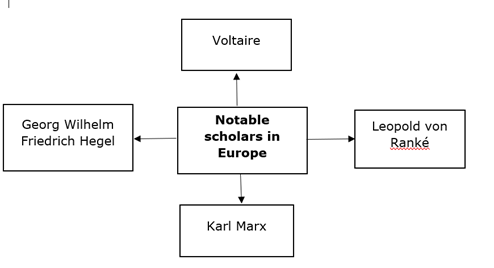Class 10 MAHARASHTRA STATE TEXTBOOK BUREAU Solutions Social Studies Chapter 1 - Historiography : Development in the West
Historiography : Development in the West Exercise 6
Solution 1(A) (1)
Voltaire
Solution 1(A) (2)
Michel Foucault
Solution 1(B)
4. Wrong pair- Karl Marx
Karl Marx- Das Capital
Solution 2 (1)
It is a method of analysis which is based on opposites. In this method a theory is proposed at the beginning, which is called, 'Thesis'. Then another theory is proposed, which is contrary to the thesis, called, 'Antithesis'. After logical discussion of both, a new thesis is proposed which includes the essence of both, the thesis and the antithesis. This process of arriving at the new thesis is called, 'Synthesis.
Solution 2(2)
In the beginning of the 20th century, a new school of historiography emerged in France which came to be known as 'Annales School'. Its main features were:· This School gave a new direction to History writing.· Annales School emphasised that History is not only about political events, kings, great leaders but it is also about the climate, local people, agriculture, trade, technology and social divisions.
Solution 3(1)
Since the ancient times, the role of women in history was neglected. Thus, emerged feminist historiography that emphasised not only on the inclusion of women in history but also on the rethinking of the male dominated perspective of history. In induced the historical research to focus on various aspects of women's life like their role in economy, society etc. In the historical writings after 1990 women figured as an independent social class.
Solution 3(2)
Foucault believed that that the prevailing practice of arranging historical events in a chronological order is not right. He drew attention to the fact that archaeology only helps in explaining transitions in the past and does not strive to reach the ultimate historical truth. Foucault felt that explaining the transitions in history is more important. He called his method, 'the archaeology of knowledge'.
Solution 4

Solution 5(1)
Karl Marx was a German thinker who propounded the theory of class struggle.
- According to Marx, all people are not equal in society. It is because sources of production are controlled by only a few people.
- This inequality causes a division of society into various classes
- The rich section of society who control the means of production exploit the poor section of society.
- This causes class struggle. According to Marx, human history is the history of class struggle.
Solution 5(2)
Four main characteristics of modern historiography are:
- Its method is based on scientific principles. It begins with the formation of relevant questions.
- These questions and writings are anthropocentric. It means that historians ask questions about the actions of humans in a particular period. They do not deal with any interaction between human actions and God.
- Answers to the asked questions should be based on concrete evidence.
- History presents to us the journey of humankind with the help of past human actions.
Solution 5(3)
- Feminist historiography is the writing of history from the perspective of women.
- It stresses on rethinking of male dominated perspective of History.
- It emphasised on inclusion of women in History.
- Feminist historiography drove the historians to research about the contribution of women in various fields like their role in trade union, offices, economy, etc.
Solution 5(4)
- Leopold von Ranke greatly influenced the historiography in the 19th century. It is because he laid emphasis on the critical method of historical research.
- He believed historical information should be gathered by examining original documents only.
- He further said that all types of documents associated with a historical event need to be examined with greatest care to arrive to the historical truth.
- He criticised the imaginative narrative in History.

